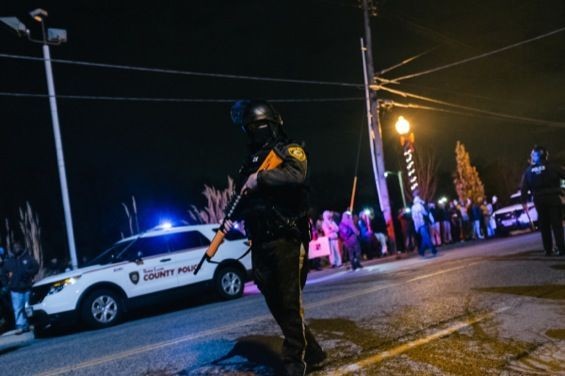
Just 24 hours ago, everybody in St. Louis seemed to know someone getting advance notice of the grand jury's decision regarding the fatal shooting of Michael Brown.
Law enforcement officers said they'd get 48 hours notice from officials. So did medical workers. Schools promised to give parents several hours of notice so they could get children home safely. The message was clear: There will be time to prepare before the big decision comes down.
The Washington Post and CNN broke the news that the grand jury had come to a decision, each citing anonymous sources. By the time official word came down that the announcement was ready, the city -- and, critically, Brown's family -- had already heard it on the news.
See also: Tear Gas, Shootings, Arson and Looting in Ferguson After No True Bill Announcement
When St. Louis County Prosecuting Attorney Bob McCulloch's office announced that he'd release the decision at 8 p.m., St. Louis balked. Why so late? Why release it at the time protesters typically start gathering in front of the Ferguson police station? Why not wait until morning to give people daylight hours to prepare?Who thought annoucing the decision at night was a good thing? #JusticeForMikeBrown #GrandJuryVerdict
— Janee In The Mid-Day (@mzjanee) November 25, 2014An 8pm announcement is NOT a good idea. Most of the #Ferguson police repression, back in August, took place then. #inners #FergusonDecision
— maria lia calvo (@MariaLiaCalvo) November 25, 2014This is made for cable news. #Ferguson RT @mattyglesias: releasing the grand jury news at 8pm is ridiculous. What a clown show.
— Eli Yokley (@eyokley) November 25, 2014Police in August: Please don't protest at night.
Police in November: Let's announce the decision at 8pm.
— Madeline Marshall (@Maddie_Marshall) November 24, 2014We coordinated with law enforcement, gave schools time to get all children home and in a safe location, gave businesses time to make a decision regarding their employees' safety, prepared our statement and then made the announcement. We also had to give media time to set up.
Jeff Rainford, Mayor Francis Slay's chief of staff, said he understood why McCulloch made the announcement so late.
"Once [McCulloch] had a decision, for the sake of transparency, he couldn't sit on it and wait for the right time to release it," Rainford tells the Wall Street Journal. "So I think he released it for his own purposes, which are legitimate ones, which is to get the information out to people as quickly as possible. I do think it had the unfortunate benefit of making it difficult to deal with."
The impact of this timing on protests in Ferguson was severe. A peaceful crowd had already gathered at the Ferguson police station and on Canfield Drive, where Brown died, one pacing young man gave a verbal countdown: "Three minutes, White America. Two minutes."
Then, the announcement started. A hush fell over the street. After McCulloch read the words, "no true bill," the crowd either rushed to protest or slammed their doors for safety. "They let that nigga off!" someone shouted.
Glass started breaking. Then came the looting, gunshots and fires. St. Louis County Police Chief Jon Belmar called the destruction that night "worse than the worst night we ever had in August."
Monday morning, St. Louisans were still wondering how the timing affected the disappointing outcome:After months to prepare, McCulloch's decision to release the verdict at night, without consulting law enforcement, was beyond irresponsible.
— Antonio French (@AntonioFrench) November 25, 2014I think Ferguson prosecutor released decision at night to inflame the crowds so their behavior would become the story, not the decision.
— JackMack (@jackthecat11) November 25, 2014Pretty calm in Ferguson in the daylight at the moment. Makes the decision to announce the verdict late at night all the more perplexing
— Paul Danahar (@pdanahar) November 25, 2014Who though it was a good idea to release the ferguson at night rather then during the during daylight
— Patrick Coyne (@PCoyne2) November 25, 2014




